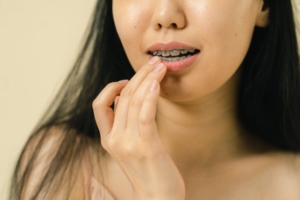
In most cases, braces are recommended during childhood or early adolescence. However, misalignment of teeth or other dental issues might also cause complications in adults. Here are some signs to find out if you could benefit from dental braces:
Crowding of Teeth
The most common issue addressed in orthodontic treatment is crowding. It occurs when there isn’t enough space in your mouth to accommodate all of your teeth, making it difficult to brush and floss. This results in tooth decay, gum disease, foul breath and bone loss around the teeth.
Crooked Teeth
Crooked teeth hamper the ability to maintain oral hygiene. As a result, food gets lodged between the teeth, causing poor breath and gum disease. Not only does it make it unpleasant to smile, but it also increases the risk of cavities in the mouth.
Visible Gaps Between Teeth
This condition arises when the size of the teeth is smaller than the size of the jaw bone. Gaps between your teeth are an indication that you need braces. If not treated properly, you’ll develop tooth decay, plaque build-up, jaw misalignment and other eating issues.
Bite Issues
Underbite
An underbite occurs when all upper front teeth are positioned beneath the lower front teeth. This is more common in people with a disproportionately large jaw. Underbites can also hasten the aging of the face and make it appear unbalanced.
Overbite
When the upper front teeth overlap the lower front teeth excessively, it’s called an overbite. It’s associated with many health and dental issues like tooth wear and gum recession. In the event of an injury, there is a higher risk of trauma to the front teeth and a higher possibility of fracturing the front teeth.
Crossbite
An upper tooth crossing behind a lower opposing tooth results in a crossbite. If left untreated, it can lead to asymmetric jaw growth, severe tooth wear and significant gum recession around the afflicted tooth.
Openbite
An open bite occurs when your teeth do not touch when you bite down. Speech impairments and biting difficulties are common side effects of open bites.
Difficulty in Chewing or Other Functions
Misaligned teeth are linked to frequent tongue bites, cheek bites and lip bites while chewing food. In some situations, it may even result in difficulty in swallowing meals.
Jaw Pain
An uneven bite puts too much pressure and stress on the jaw bone, causing discomfort across the joint. Jaw pain should be addressed immediately. It can be reduced by straightening the teeth and correcting the bite simultaneously.
If you are facing any of the above symptoms, visit a dentist immediately and see if you require braces. At Home of Smiles Dental Clinic, you can seek advice and treatment plans about your dental issues. We offer low-cost, high-quality and compassionate dental care to all our patients.

